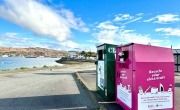UK Government to exclude glass from Scotland’s Deposit Return Scheme
The UK Government has set out its support for a temporary exclusion from the Internal Market Act for Scotland’s planned Deposit Return Scheme, but limiting its scope has prompted criticism from First Minister Humza Yousaf.
 The Department of Levelling Up, Housing and Communities policy paper (published on Saturday 27 May) has set out the basis for a temporary exclusion of the UK Internal Market Act 2020 to enable the Scottish Deposit Return Scheme to launch in 2024, as planned. One of the conditions of the temporary exclusion is that it will only cover PET plastic, aluminium, and steel cans, and will last from the launch of the Scottish scheme until other planned schemes are in place in the rest of the UK, to move towards 'maximum alignment and interoperability'.
The Department of Levelling Up, Housing and Communities policy paper (published on Saturday 27 May) has set out the basis for a temporary exclusion of the UK Internal Market Act 2020 to enable the Scottish Deposit Return Scheme to launch in 2024, as planned. One of the conditions of the temporary exclusion is that it will only cover PET plastic, aluminium, and steel cans, and will last from the launch of the Scottish scheme until other planned schemes are in place in the rest of the UK, to move towards 'maximum alignment and interoperability'.
'Scuppering' the Deposit Return Scheme
This position is at odds with the Scottish Government’s ambition for the scheme. First Minister Humza Yousaf told the BBC on Saturday: “They're not just trying to scupper the DRS - they're trying to undermine devolution. We've seen it multiple times.
"Not only is it bad in terms of devolution and self-government, it's really poor for the environment. If we don't include glass that's 600 million bottles that won't be moved from our streets, our beaches and our parks."
The UK Internal Market Act allows the free flow of trade within the borders of the UK. The exclusion is required to ensure that the Deposit Return Scheme applies to containers bottled outside of Scotland, which otherwise the Internal Market Act would prohibit – putting Scottish producers at risk. The Scottish government applied for the exclusion in late February.
The policy statement says that the proposals will ‘impact thousands of businesses in England, Wales and Northern Ireland as well as those based in Scotland’. The UK Government has noted the ‘powerful representations made by a broad range of businesses across the UK that interoperability of schemes is critical to avoiding unnecessary barriers to trade’.
Another condition of the exclusion is that a maximum cap on deposit levels will have to be agreed upon with the rest of the UK before the Scottish DRS is launched in March 2024, having been delayed from August 2023 by the First Minister in April.
Current plans for a DRS in Wales also include glass. DRS in England, Wales and Northern Ireland are currently scheduled for 1 October 2025.
Scottish Minister for Green Skills, Circular Economy and Biodiversity, Lorna Slater, commented: “Despite discussions over the last two years this is an eleventh hour attempt by the UK Government to sabotage Scotland’s deposit return scheme by forcing us to remove glass bottles.
“This is at odds with all the evidence that says the biggest benefits, economically, financially and environmentally, are from including glass.
“We are now going to have to look very seriously at where this leaves the viability of the Scottish scheme and talk to businesses, delivery partners and other organisations over the coming days and weeks.”
Why is glass being excluded?
The policy statement explains that the decision to exclude glass was made due to the strong representations, particularly on the impact on trade and consumer choice, made by businesses – including distillers and the hospitality sector.
The UK Government says that the inclusion of glass would create a permanent divergence, would be a very significant step for businesses and consumers and that there is insufficient justification for such an approach.
It concludes that the inclusion of glass would add cost and complexity to the schemes, in particular to the hospitality and retail sectors, as well as add a layer of consumer inconvenience.








